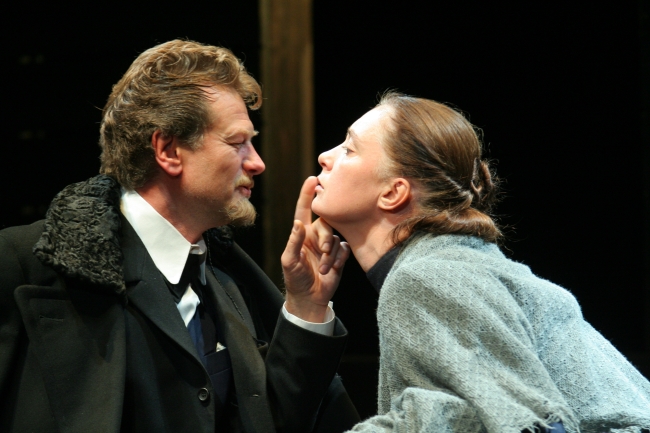It’s been more than a century since Anton Chekhov (1860-1904) died, but his works dominate the life of Russian theater director Lev Dodin.
“I don’t think of Chekhov as a dead man,” said the Russian director at a press conference on Tuesday, promoting Chekhov’s “Three Sisters” he brought to Seoul.
“I always talk to Chekhov. His works are what give me the joy of creating art. I feel like he is still very much present in the contemporary world.”
This is Dodin’s second time staging Chekhov’s work in Seoul, following the 2010 run of “Uncle Vanya.” He said “Three Sisters” is one of the most complex works by Chekhov, which reflects the playwright’s own personality, imagination, fear and despair.
 |
A scene from Maly Drama Theatre’s “Three Sisters,” directed by Lev Dodin. (LG Arts Center) |
“If you think the three characters of this play are lazy and not being productive, you are not really getting the piece,” he said. “They are rather hard working individuals who are in search of what is missing in their lives.”
Chekhov wrote the play in 1900, depicting the lives of three sisters ― Olga, Masha and Irina ― and their brother. The three women, who grew up in Moscow, move with their father and brother to a small provincial town. Their father dies in the town, and the women, stuck with each other while frustrated with provincial life, desperately yearn to return to the urban life of Moscow.
“The characters want to return to Moscow, but Moscow is only a symbol,” Dodin said. “What they miss is the city of their childhood, hope, and the kind of place that does not represent their present.”
 |
Russian theater director Lev Dodin speaks during a press conference promoting his play “Three Sisters” in Seoul on Tuesday. (LG Arts Center) |
Some have suggested that Chekhov, who is known to have read about the Bronte sisters four years before writing “Three Sisters,” may have partially been inspired by the situation of the three sisters ― Charlotte, Emily and Anne ― when writing the play. The 19th century literary sisters of “Jane Eyre” and “Wuthering Heights” fame had tragically short lives. The early deaths of their mother and two older sisters heavily influenced their lives, and they lived with each other ― along with their brother Branwell ― for many years.
However, Dodin said he has never heard of the Bronte connection in Chekhov’s work. “I’ve never heard of the connection and there is no reference of (the Bronte sisters) in my work,” he said.
“Three Sisters” is the kind of tragedy that ironically brings hope.
“There is no question that this play is a tragedy,” he said. “The characters get hurt, fall into despair, and don’t get what they search for. But in the end, the tragedy ends with hope because in spite all of that, we human beings keep trying and continue living. We don’t give up.”
The director said he feels Chekhov is misunderstood at times, especially when his characters are bashed for being “idle” or “lazy.”
“He was a medical doctor and a playwright at the same time. He knew he was going to live a short life and therefore was very familiar with the concept of death. He constantly thought about the meaning of life, and how to spend his limited time. His characters were created based on those thoughts, and I think that is the key to understanding his works.” Chekov died at the age of 44.
Dodin’s “Three Sisters” runs through Friday at LG Arts Center in Seoul. The play is being performed in Russian with Korean subtitles. For information, call (02) 2005-0114.
By Claire Lee (
dyc@heraldcorp.com)









